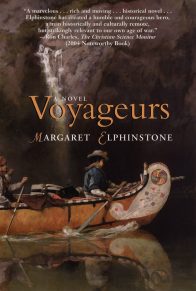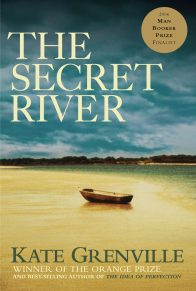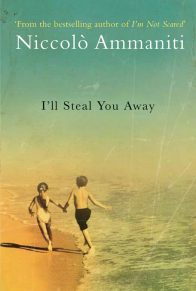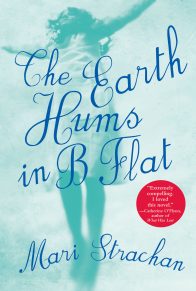Inside the lantern there was only light, and the hot rich smell of burning oil. Outside was blank dark. Close to, it was not one light, but twelve. Each lamp had its own reflector, a concave hemisphere lined with a mosaic of mirrors. Flame reflected flame across the curved surfaces until all the lights merged into a single beam directed outward into the surrounding sea. Looking into the light along the beam was like looking at the sun. If she did that she was left seeing only green spots with fiery edges swimming against her eyes, until they gradually faded away into nothing at all.
The trick was never to look into the light directly. She could look through the beam, at the floor, at the oil reservoirs, at the rectangular shapes of the six window frames surrounding her. Here at the top of the tower everything was sharp and bright, and outside this little hot space there was only emptiness.
If only that were true. If only they could have been left in peace, and overlooked, as they had been all these years.
If only it had never happened.
Lucy realised she was blaming herself yet again. But she couldn’t stop wondering, even after five whole years, if she could have done anything to prevent it. Because now . . . If she’d managed to get down to the rocks that night . . . If she’d managed to reach Jim – then this other thing wouldn’t be happening now.
On a day like today it was impossible to recapture the power of the wind. She of all people should know about the wind. She’d seen enough of what it could do to the sea. Of course she couldn’t have stood up to it that night. Of course not. But she couldn’t stop herself going over it again. She couldn’t help re-living it over and over, wondering what she might have done differently.
That night she’d battled the wind with all the strength she had. She’d kept on staggering forward – she’d never dreamed of turning back – holding on to the rope. The wind kept knocking her over. Then the lantern had smashed on a rock. What more could she have done, when she couldn’t even see? In the swirling dark she’d struggled on, feeling for familiar ground. The wind had eased. She’d realised she wasn’t heading into it any more. Then she’d seen: down below there was white water where none should be. She’d been pushed too far to the south, almost into Cam Giau. The light never shone down there, so she’d not seen the edge through all the spray.
She’d fought her way back onto the grass, though somehow she’d lost the rope. Now the white water had gone she’d seen nothing at all. She hadn’t been able to hear where the sea was, because the same wild roaring was everywhere. She’d seen the surf again just in time, right below her feet. But it was on the wrong side. Uphill had to be the way back. She’d got up high enough and there’d been grass underfoot. The wind hurled her off her feet. Her head banged on a rock. She’d been soaked already; she hadn’t even noticed the blood. She’d nearly got to the top, as close as she could without being blown off. She kept being thrown down on sharp rocks. The sea was breaking right over the island. Right over the grass. She couldn’t have gone closer. Only she’d had to keep close to the edge to know where she was. The wind had kept flinging her towards the water. Then she’d been crawling uphill, with the waves breaking right over her. The waves had broken right on top of the island. She couldn’t have gone any further. It had been impossible to go any further.
But if only she’d managed it . . . If she’d only found the strength . . . If she’d willed herself not to be weak . . . If she’d not failed him that night – if she’d not failed all of them – then Jim would be alive now.
If Jim were still here, there would never have been the letter.
There was no point blaming herself, five years later. No one else blamed her. Diya had never spoken a word of blame. No one else supposed for one moment that she’d not done all that was possible.
She still thought – it was so hard now, to remember what that night had been like – that she should have tried again. Or gone with Jim in the first place. He’d said no, he could manage. He’d told her to stay in the house. That didn’t mean she couldn’t have thought for herself. She wasn’t bound to do what Jim said. She knew what had to be done just as well as he did. She should have known.
But it was so hard to remember what it had been like. Not being able to stand against the wind. Not being able to see. Not being able to think.
Lucy put down the oil can, and unlatched the south window. She threw her shawl over her shoulders and sat, so that her silhouette didn’t get in the way of the light, on the step of the metal platform that ringed the lantern. Now she could see out. She might feel she was suspended in a solitary bubble in the midst of chaos, but actually she was here, in this tower, in the middle of the world.
The light beamed out behind her. It made the stars very dim, but Mars shone red, low over the western horizon, and if she twisted round she could see the Plough just setting to the north of it. North-east, the two lights on the Calf flashed every two minutes. When she looked east she saw a thin pale line of light. The earth – Lucy sometimes allowed herself to be fanciful in her solitary moments – had survived the night. Somehow the thought calmed her. Human lives were so little: people did what they could in this world, and no one could do more. Lucy sighed, and rested her elbows on her knees.
The sea rose and fell against the shore like a dragon breathing gently in its sleep. As Lucy’s eyes adjusted she could see pale lines of light that came and went: each rising wave caught for a moment in the beam of light before it broke. Then the next wave rose and broke, rose and broke, one white gleam for each, then nothing.
Shadows stretched away from the tower where the rocky outcrops caught the beam. There was no moon, so each elongated shadow was quite black, all of them reaching as far as they could away from Lucy, in a circle of which she was the centre. Only the tower on which she stood had no shadow. The night was almost done. She was thinking about Jim. What would he have done if the letter had come to him?
A pinprick of light appeared to the south-west about a quarter of a mile away, very pale in contrast to the thin stripe in the east, which was now tinged with orange.
Slowly the world turned grey, and then as white as ice. The water separated itself from the sky and became flat and bleak. Shapes humped out of the sea. The Calf of Man to the northeast was lightly etched in pencil, its lights dimmed by the growing dawn. Over the left shoulder of the Calf rose, faint and far away, Cronk ny Arrey Lea, and, in the far distance east of the Calf, she could just make out Snaefell. To the south, the little light went out, and turned into the ghost of a ship in full sail. Lucy fetched the telescope from the light room and held it to her eye, adjusting the focus. She saw a circle of magnified ripples, and then, after casting around for a moment, she found a brig with all sails set to catch as much of the fickle breeze as they could. No, it wasn’t a brig – it had an extra mast – a ketch, perhaps? – a schooner? – no, it was a snow. It was too far away to make out her name. The ship was heading east against the tide, bound for Whitehaven probably, keeping a cautious quarter-mile clear of the tidal skerries that lay to the south of the lighthouse. Lucy saw the sails flap, and reluctantly fill again. It might be like that all day. The snow wouldn’t be out of sight of the island for a good while yet. As Lucy watched, she saw the grey sails suddenly brighten, and the whole ship was bathed in yellow light.
Lucy went into the lantern, took the snuffer from its hook, and went clockwise round the twelve oil lamps, extinguishing each flame in turn. As each one was doused its mirrors all went blank. Smoke rose from the wicks, and vanished in the growing dawn.
The Calf lights were out. The sky was awash with orange and pink. The far lands turned purple. Now the sun was burning into the sea; she had to half-shut her eyes to look. A path of light shot from the heart of the dawn to the foot of the tower. The red sun was a line, a curve, a half circle. Lucy felt sunlight on her face. Down below on the island, the cock began to crow.
Chapter 2
He’d been dreaming he was back on cape wrath doing the first survey. The wind howled over the headland. They could barely stand, let alone measure. At least the chain was too heavy to blow off . . . he hoped it was too heavy but it seemed to be floating somehow, and slippery like seaweed. Spray shot up three hundred feet and drenched them. Smith, junior to him though far more experienced, was shouting in his ear, “Get down, sir! We must get down!” They were running – he and Smith and Ben Groat the apprentice – pummelled by the wind, east down the lee slope away from the cliffs. The land curved round to the jetty – there wasn’t any track – and they crawled into a sheltered hollow under the rocks. It was all Archie’s fault. He hadn’t wanted to be defeated, not even by the weather. Now he was being punished. He’d made a mistake. Somehow he was back on the headland being blown seawards by an almighty wind. There was no withstanding it, and the edge was very close . . .
“You all right, sir?”
Archie opened his eyes. Daylight filtered into the room through the crack between heavy curtains. The boots was leaning over him, looking concerned.
“Half past five, sir. Were you wanting hot water, sir?”
“Yes, of course I do,” said Archie irritably. “I ordered it last night.”
When the fellow had gone Archie lay for a moment looking at the cracks in the ceiling. Where had that dream come from? He’d eaten a dish of large Manx oysters last night, but all the same . . . all he’d had to wash it down was a single glass of port. And he had nothing to be nervous about; the present job was simple enough. Cape Wrath had been far harder.
This was no time for nightmares. He was lying, for once, in a comfortable bed in a decent inn. It was worth savouring the moment: from here on the travelling would be rough. The George Inn in Castletown was a respectable coaching establishment, quite unlike anything one would find in the Hebrides. There’d even been a discreet notice downstairs advertising Assemblies for members of the ton on Friday nights, and sure enough when he’d been looking for Benjamin Groat last night he’d stumbled into a spacious ballroom on the first floor. The polished floor stretched emptily to a little alcove at the end, and the whole room smelt overpoweringly of wilting lilies. High society was quite beyond his touch, and anyway by Friday night they would be on Ellan Bride, God willing, a far cry from genteel Castletown.
No, he had no ambitions in that direction. He could have come post from Douglas if he’d chosen; the turnpike road was excellent. He’d preferred to travel in the gig with Groat and Scott. Ben Groat could have been trusted to look after the gear, but Archie felt happier not letting it out of his sight. He knew nothing about these Manxmen. Hebrideans, however poverty-stricken, could usually be trusted to be honest, unless, of course, it was a matter of wreck.
“Half past five, you were saying, sir.”
Archie jerked awake. He must have drifted off again.
“It’s twenty to six.” The boot boy was standing over him again. “Your hot water’s on the stand, sir. And your boots is done, sir. I left “em on the mat there, sir, and . . .”
‘very good.”
The boots got breathlessly to the end of his message, “. . . and breakfast is serving in the coffee room, sir.”
When Archie sat up the room still swayed, although the Mona’s Isle had been pretty stable, just a trifle choppy off the Mull of Galloway. So whatever had made him dream about Cape Wrath? It was all so long ago. The lighthouse on Cape Wrath had been finished three years since. He’d visited it once since it was lit, from the Regent.
If he saw Mr Quirk at nine . . . And now there was this other matter to settle. Yesterday evening, while Archie had been down to the harbour, where he’d discovered that it would be much simpler to keep the gig and travel overland to Port St Mary, his two chainmen had taken themselves off to a harbourside tavern. While Archie had been planning their onward journey, his henchmen had done their best to botch the whole job from the very start.
Damn Scott! What had he been thinking of? Nothing, of course. The man never thought. And there seemed to be more taverns to the square mile in this town than in Glasgow, even: naturally that had been too much for Scott. Archie glanced at his watch again. Ten to six. He flung back the blankets and strode over to the window.
When he pulled back the curtain sunlight flooded the room. Archie looked down from his second-floor window onto the market square. Opposite was the grey posterior of Castle Rushen, much less imposing from this angle than from the river side, which had been their first view of it from the Douglas road. He looked at the clock on the castle wall, thinking to check his watch, but it had only the hour hand. “Eliz. Reg.” said the clock face: “1597”. And yet from all that he’d heard these Manxmen insisted that they weren’t English.
Archie pulled up the window-sash and knelt to lean out. He could smell the sea, and the rich tang of seaweed. There was no wind, and the drought showed no signs of abating. They’d need a wind tomorrow, but there was nothing to be done about that save whistling for it. Otherwise the day was as fine as it could be, and from somewhere below him he could smell bacon frying.
The prosperity of this little town seemed English too. The market square was overlooked by douce three-storey houses, lining the narrow paved streets which went off in all directions. The cobbles were empty and newly swept, and to the right an imposing modern church blocked the view to the sea. Next door to the George a maid was on her knees scrubbing the half dozen steps up to a pleasant modern townhouse. After years of working in the benighted Highlands, Castletown seemed a most attractive little town.
Archie found himself thinking about his dream again while he shaved and dressed. His mother would have listened to no nonsense about port and oysters. She’d taught him to respect his dreams. So why would all that come back to you, Archie? What haunts you still? Well, there was last year’s voyage on the Regent, for a start. He liked his employer’s sons well enough. Young David Stevenson had been there, on his first tour of the lighthouses. It had been Archie’s job as Assistant to teach the thirteen-year-old David as much of the work as he could. He’d seen David’s elder brother Alan put through the same process. Alan was seven years younger than Archie. Alan would be made partner in the firm before this year was out, and then it would be Stevenson and Son.
Archie tied his starched cravat carefully, and put on his frock coat. He’d have to come back here and change before they left. More waste of time. He wasn’t looking forward to this morning. He hated dealing with local officials, and in this case there was nothing to say anyway. He wanted to get out to the site. If only they could get away today they’d still have two clear working days before Sunday, which would have given him enough material to start drawing. Archie had no objection to breaking the Sabbath himself, but he couldn’t ask the chainmen to do so: Ellan Bride was hardly in the same league as the Bell Rock. However, as matters stood they’d probably have to leave tomorrow – Friday – unless they went with the tide this evening . . . The boatman might be willing to stay on Ellan Bride overnight. So even if this Mr Quirk kept him waiting all morning it wouldn’t actually make much difference. And now there was the extra man to be thought of . . . Damn Scott! Damn him!
No one else was breakfasting at half past six, so Archie had the table in the coffee room to himself. The fire hadn’t been lit, but the sun was streaming in through the window. Wooden clogs clattered in the street as folk hurried to their work. A cart rattled by, its iron wheels grating on the cobbles. A fishwife with full basket was crying her wares, and out of the window he saw the maid at the townhouse leave her clean doorstep to buy fresh herrings. The day beckoned.
But he wasn’t left in peace for long. The landlord brought the coffee himself, and hovered round Archie while he ate his ham and eggs, obviously wanting to talk.
“Edinburgh,” Mr Kneen said cautiously. “Now that was in the papers too. This terrible cholera! We were hearing the sickness had reached Edinburgh – I was reading that but two or three months back.” He glanced at Archie anxiously. “You yourself will have encountered it, no doubt?”
“Oh ay, it was bad. But I wasn’t in town then.” That seemed rather a short answer. Archie made an effort to be friendly. “I was working up north when the cholera broke out. Dunnet Head. That’s on the north coast of Scotland.”
“Ah, you’ll have built some lighthouses up there too, no doubt?”
“Ay, I’ve worked up there quite a lot.”
‘so you weren’t in Edinburgh for the sickness? They say it’s very catching. Very. You just need to breathe in someone’s breath, that’s all, and you’ve caught it. And then – just in an hour or two – that’s you dead – finished!”
Archie shook his head. “Oh no! It’s not infectious. I mean, a traveller from London or Edinburgh, say, couldn’t bring it here. It’s not like that.”
“You’re sure of that, sir? I heard that when it takes a hold, folk start dying like flies, in their hundreds. Thousands, even, all in the same place. Bodies lying in the streets rotting, and no one to bury them.”
“Ah, but that’s the point.” As ever, Archie was drawn into conversation by the technical question. “It spreads, but ay in the same place. It’s not infectious – not like plague, for example – where one man could carry it across a continent. It spreads some other way. No one quite knows – they talk about a miasma – a contagion in the air. When the air is polluted, anyone who breathes it is at risk. But humans don’t carry air around with them.”
Mr Kneen still looked worried. “It’s these big cities that’s in now. Man wasn’t made for to live in great cities. These city folk think we all want to be like them, but there’s some of us would be happier left alone, and that’s a fact.” He took a cloth, and began polishing the pewter tankards that lined the dresser. He obviously wasn’t intending to go away yet. “But you’ll be a city man yourself, sir?”
“No.” Archie added, as Mr Kneen seemed to be waiting for him to speak. “Not originally.”
There was a short silence. Mr Kneen adjusted the shining tankards on their shelf. “You’ll have been in the lighthouse trade a long time, then? But you’ve not been here before? You didn’t work at the Calf or the Point of Ayre?”
“No.” After a short pause Archie volunteered, “I worked at the Mull of Galloway, though. I’ve often seen the Isle of Man from there.”
“Ah yes, I was hearing about the grand new light they’ve put there. You can see it from Peel on a clear night, so a fellow was telling me the other day. So you built that light?”
“I was one of the engineers,” Archie corrected him. He became a little more expansive. “I hadn’t seen it from the sea since it was lit, though – not till yesterday. I came down on the Mona’s Isle, and I got a good look at it when we rounded the Mull.” He relapsed into silence. He couldn’t begin to explain the excitement he’d felt when he’d come on deck to see the Mull of Galloway lighthouse from the sea. Gleaming white in the rays of the rising sun, it had looked so familiar, and yet it was strange in its completed state. There was always something extra about the finished thing – something more substantial, a little more like itself, than even its designers had been able to imagine. Odd to think that folk would sail by the Mull light for centuries to come without giving the matter a thought. They’d see it now – as the scattering of folk on the deck of Mona’s Isle had been doing yesterday morning – as if it had been there for ever. No one would even begin to imagine the sweat that had gone into the building of it.
‘so you came down from Glasgow on the Mona’s Isle? They’re telling me all the time how these steamships are actually very comfortable, and quite safe too in all manner of weather. A fellow here was saying the cabins are as well appointed as this inn! Hard to believe, out at sea, but he swore to it. And they can make the passage just the same whatever airt the wind is in. It wasn’t like that when I was a boy. Indeed it wasn’t. But you’ll know all about these great steam engines, sir?”
“I don’t know anything about steamships. But they did let me into the engine room yesterday.”
“Now a fellow here was telling me all about that. He’d been talking to one of these steam engineers. A dirty job, and dangerous awful, down in the bottom of the ship with great machines clanking round you all day long. Pitch dark too. It’s an awful big ship too, the Mona’s Isle. And they go at a terrible speed, day and night, like there was no difference between the two! You’d never get out of that engine room if she was to sink, God forbid! I don’t know how big she is, or how fast she goes, but it would make me anxious, and that’s a fact.”
“Two hundred tons,” said Archie absently. “And up to nine knots. No need to be anxious though: she was built at John Wood’s in Glasgow.”
Someone was shouting from the hall, “House! House I say! Is anyone there? Kneen, are you there?”
“I must go, sir. Will you excuse me?”
Thankful for the interruption, Archie buttered his toast, and seized the chance to look over the notes in his pocketbook.
He wrote underneath them in pencil: Watterson. Betsey? Check draught. And then again, as he sipped his coffee: Scott?
Scott was the very devil. Would Mr Stevenson expect him to stand bail for the fellow? They had their own laws out here. God-forsaken ones too, probably. So long as they didn’t decide to transport the fellow: if it was as bad as that Archie would have to intervene. Though why should he? God knew what sort of sentence Scott would get. Maybe God cared; Archie didn’t. He was inclined to leave Scott to rot. He’d brought it all on himself, after all, and Archie had a job to do. But Mr Stevenson might have other views about it. Bound to have, in fact. Did it matter? He didn’t need to please Mr Stevenson any more. Archie had given everything to this job, and it had taken him this long to realise there were no more rewards for an ambitious young fellow unless his name was Stevenson. No, there was no need to worry about what Mr Stevenson would say about Scott.
Archie poured more coffee. While he sipped he unfolded a letter that was already limp with constant re-reading. It was sheer indulgence: he knew its contents by heart, but it gave him inordinate pleasure just to see the words again. That’s why he’d brought the letter with him. It still said exactly the same, and it still thrilled him every time he looked at it. He was just beginning to realise that it was all true: this thing really was going to happen.
Dear Mr Buchanan,
Further to our meeting of the 17th inst, I am gratified to be able to inform you that your application for the post of surveyor to the Scientific Expedition of HMS Beagle has been successful. You are required to report for duty at HMS Beagle, currently stationed at Greenwich, by September 1st, 1831.
Following our illuminating discussion in London, I would highly recommend a perusal of Mr Lyell’s new volume. Some of his arguments are unnecessarily ambiguous, and could even be interpreted as atheistical, but he is a man of sound observation, and, as far as I have yet read, he does allow a man the freedom to draw his own conclusions. You may find the work pertinent to our proposed expedition.
I should remind you that the Beagle is a ninety-foot ten-gun brig, and will be carrying its full complement of sixteen officers. In addition there will be five supernumeraries, including yourself. Space for equipment and personal effects will therefore be severely limited.
May I be the first to congratulate you on this splendid opportunity? I look forward to renewing our acquaintance. Yours &c,
Robt. Fitzroy
Commander, HMS Beagle
Four months to go. Only four months. To hell with Scott. To hell with Quirk the Water Bailiff, and to hell with this Godforsaken Island. To hell with . . . no, never to hell with Robert Stevenson. Archie owed him too much, and liked him too well. It was going to be hard to tell the old man. But, even so, Archie had his letter. He could only begin to imagine how much this was going to change everything.
©2006 by Margaret Elphinstone. Reprinted with permission from Grove Atlantic, Inc. All rights reserved.













